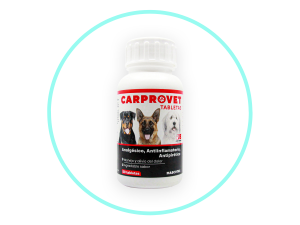





Carprovet for dogs is a prescription medication that’s designed to help relieve pain and inflammation in canines. Veterinarians often recommend Carprovet for dogs who have been diagnosed with conditions such as osteoarthritis.
At AvenueDogs.com, we’re here for you and your pet. While our aim is to provide you with up-to-date information on everything related to your dog’s health, we encourage you to speak with your vet before changing your pet’s regular routine. That being said, let’s get started!
If you’d rather listen to this blog, just click play on the YouTube video below:
If you’d like to know more about home medications that can help your pet, check out our vet-approved list below:
| Dyne for Dogs: For Energy & Weight Gain | Omeprazole for Dogs: For Ulcers & Inflammation | Enrofloxacin for Dogs: For Bacterial Infections |
Cefpodoxime for Dogs: For Bacterial Infections | Sucralfate for Dogs: Chronic Upset Stomach | Cosequin for Dogs: For Joint Health |
| Ursodiol for Dogs: For Liver & Gallbladder | Trazodone for Dogs: For Anxiety & Aggression | Mometamax for Dogs: For Ear Infections |
| Credelio for Dogs: For Ticks & Fleas | Chlorpheniramine for Dogs: For Allergy-Related Conditions | Butorphanol for Dogs: For Painful Coughs |
| Dinovite for Dogs: For Irritating, Itchy Coat | Dasuquin for Dogs: For Joint Health | Meloxidyl for Dogs: For Pain & Inflammation |
| Glandex for Dogs: For Digestive Support | Rilexine for Dogs: For Bacterial Infections | Enalapril for Dogs: For Cardiac Conditions |
| Quercetin for Dogs: For Allergy & Inflammation | Carprovet for Dogs: For Pain & Inflammation | Pimobendan for Dogs: For Congestive Heart Failure |
| Simplicef for Dogs: For Bacterial Infections | Clindamycin for Dogs: For Bacterial Infections |
Until then, check out some vet-approved info on Carprovet for dogs.
Top 17 FAQs for Carprovet for Dogs
There are a lot of questions surrounding Carprovet for dogs. The medication can be a life changing option for dogs with painful or chronic conditions. However, there are some drawbacks to the drug as well you should take into consideration.
Before we get too deep into the Carprovet for dogs discussion, we’ll take a quick look at what you can expect. Afterward, if you still think the medication could be a good fit for you and your pup, we’ll go into further detail.



By the end of the article, you should have the information you need to approach your veterinarian.
#1 What Is Carprovet For Dogs?
Carprovet for dogs is a non-steroidal anti-inflammatory drug (NSAID) primarily used to relieve pain and inflammation in canines.
#2 What Are The Uses Of Carprovet For Dogs?
Carprovet for dogs is used to manage pain associated with osteoarthritis and to control post-operative pain following surgeries.
#3 How Is The Carprovet Dosage For Dogs Determined?
The dosage is typically based on the dog’s weight. Always follow the prescribed amount given by the vet.
#4 Are There Different Strengths Of Carprovet For Dogs?
Yes, Carprovet for dogs comes in 25 mg, 75 mg, and 100 mg strengths to cater to dogs of different sizes.
#5 Is There An Expiration Date On Carprovet For Dogs?
Yes, always check the expiration date before administering and avoid using expired medication.
#6 What Ingredients Are In Carprovet For Dogs?
The active ingredient is carprofen. The tablets may also contain other inactive ingredients.
#7 How Long Should I Give My Dog Carprovet?
The duration depends on the condition being treated. Always follow the vet’s recommendations.
#8 What Are The Side Effects Of Carprovet For Dogs?
Some dogs may experience gastrointestinal issues, kidney or liver dysfunction, or skin reactions. Monitoring is essential.
#9 Can Carprovet For Dogs Be Given With Other Medications?
Always inform the vet about other medications your dog is on, as there could be potential interactions.
#10 Is Carprovet For Dogs Available Over The Counter?
No, Carprovet is a prescription medication and should be used under vet supervision.
#11 Are Carprovet And Carprofen The Same For Dogs?
Yes, Carprovet is a brand name, and carprofen is the active ingredient.
#12 How Does Carprovet For Dogs Compare To Rimadyl?
Both are brand names for carprofen, so they are essentially the same in terms of active ingredient.
#13 Can Carprovet For Dogs Be Crushed?
If your dog has difficulty swallowing, consult your vet about crushing the tablet or other administration methods.
#14 What’s The Difference Between Carprovet And Gabapentin For Dogs?
While Carprovet is an NSAID for pain and inflammation, Gabapentin is primarily used for neuropathic pain and seizures.
#15 Is There A Weight-Based Dosage Chart For Carprovet For Dogs?
Yes, vets typically have a dosage chart based on weight. In general, Carprovet dosage for dogs is prescribed at a ratio of 2 milligrams per pound (2 mg/lb). Always adhere to the prescribed dose.
| Dog’s Weight | Daily Carprovet Dosage for Dogs |
|---|---|
| 10 lb | 20 mg |
| 20 lb | 40 mg |
| 30 lb | 60 mg |
| 40 lb | 80 mg |
| 50 lb | 100 mg |
| 60 lb | 120 mg |
| 70 lb | 140 mg |
| 80 lb | 160 mg |
| 90 lb | 180 mg |
| 100 lb | 200 mg |
#16 What Does Carprovet Do For Dogs?
Carprovet for dogs provides relief from pain and inflammation, improving the quality of life for dogs with conditions like osteoarthritis.
#17 Can A Dog Stay On Carprovet Forever?
Long-term use requires regular vet check-ups to monitor for potential side effects, especially on liver and kidney functions.



Think Carprovet for dogs might be beneficial for your pup? Great! Keep reading to learn more about the ins and outs of the medication.
What is Carprovet for Dogs?



Carprovet for dogs is a non-steroidal anti-inflammatory drug (NSAID) specifically formulated for our canine friends. Here’s a quick breakdown:
- Purpose: It’s primarily used to manage pain and inflammation, often stemming from conditions like osteoarthritis or following surgeries.
- Active Ingredient: The main component of Carprovet is carprofen, which is the substance that provides its therapeutic effects.
- Form: Carprovet for dogs typically comes in chewable tablets or as an injectable solution.
Think of it as a pain reliever and anti-inflammatory, similar to how we humans might take ibuprofen, but tailored for dogs’ unique needs.
Is Carprovet The Same As Carprofen?




Yes, Carprovet for dogs is essentially carprofen. Carprovet is a brand name, while carprofen is the active ingredient inside. Think of it like this: Carprovet is to carprofen what Kleenex is to facial tissue. They serve the same purpose – to reduce pain and inflammation in dogs. So, when you’re using Carprovet, you’re essentially administering carprofen to your furry friend.
What Does Carprovet for Dogs Do?
Carprovet for dogs acts as a pain reliever and anti-inflammatory agent. It’s primarily used to manage pain and inflammation associated with conditions like osteoarthritis or after surgeries.



The active ingredient, carprofen, works by inhibiting the enzymes responsible for producing prostaglandins, which are chemicals in the body that promote inflammation, pain, and fever. By reducing these prostaglandins, Carprovet helps alleviate discomfort and swelling, making it easier for dogs to move around and enjoy a better quality of life.
In essence, it offers our canine companions relief from pain and inflammation, helping them feel more comfortable.
How Does Carprovet for Dogs Work?
Carprovet for dogs works by targeting and inhibiting specific enzymes in the body called COX-1 and COX-2. These enzymes are responsible for producing prostaglandins. Here’s a simple breakdown:
- Prostaglandins play a role in promoting inflammation, pain, and fever in the body.
- By inhibiting COX enzymes, Carprovet reduces the production of these prostaglandins.
- With fewer prostaglandins being produced, there’s a decrease in inflammation and pain.
So, when a dog takes Carprovet, it’s essentially reducing the chemicals that cause discomfort. This action helps provide relief from pain and inflammation, allowing our furry friends to feel better and move more freely.
Carprovet Dosage for Dogs
Carprovet dosage for dogs is determined based on the dog’s weight and the specific condition being treated. Here’s a general guideline:
- Standard Dosage: The usual Carprovet dosage for dogs is 2 mg per pound of body weight, given once daily. Alternatively, it can be divided and given as 1 mg per pound of body weight, twice daily.
| Dog’s Weight | Daily Carprovet Dosage for Dogs |
|---|---|
| 10 lb | 20 mg |
| 20 lb | 40 mg |
| 30 lb | 60 mg |
| 40 lb | 80 mg |
| 50 lb | 100 mg |
| 60 lb | 120 mg |
| 70 lb | 140 mg |
| 80 lb | 160 mg |
| 90 lb | 180 mg |
| 100 lb | 200 mg |
However, it’s essential to note a few things:
- Always follow the veterinarian’s specific dosage recommendations for your dog.
- Dosage might vary depending on the severity of the condition or the dog’s individual response to the medication.
- Overdosing can lead to serious side effects, so it’s crucial to administer the correct amount.
Remember, while these are general guidelines, the best approach is always to consult with a veterinarian to determine the most appropriate dosage for your specific dog and situation.
How is Carprovet for Dogs Administered?
Carprovet for dogs is relatively easy to administer, and it comes in a couple of different forms:






- Chewable Tablets: These are flavored, making them more palatable for most dogs. You can give the tablet directly to your dog like a treat or mix it with their food.
- Injectable Solution: This form is typically used by veterinarians, especially post-surgery or in clinical settings.
When giving Carprovet, it’s a good idea to:
- Administer it with food or after a meal to reduce the risk of stomach upset.
- Monitor your dog after giving the medication to ensure they don’t have any adverse reactions.
Always follow the veterinarian’s instructions on how and when to give Carprovet to ensure your dog gets the maximum benefit from the medication.
What if I Miss a Dose of Carprovet for Dogs?



It’s essential to maintain a consistent routine when administering Carprovet to ensure its effectiveness. However, if a dose is missed, it’s crucial not to overcompensate, as this could lead to potential overdosing.
If you miss a dose of Carprovet for dogs, here’s what you should do:
- Give the missed dose as soon as you remember.
- If it’s close to the time for the next dose, skip the missed dose and go back to the regular dosing schedule.
- Do not double up or give extra doses to make up for the missed one.
Always keep track of the medication schedule and set reminders if necessary to ensure your dog gets their dose on time.
Does Carprovet for Dogs Require A Prescription?




Yes – Carprovet for dogs does require a prescription. It’s not an over-the-counter medication. Veterinarians prescribe Carprovet after evaluating a dog’s health, the severity of pain or inflammation, and any potential drug interactions or health conditions that might affect its use.
This ensures that the medication is appropriate for the dog’s specific needs and that it’s administered safely.
What Alternatives Are There for Carprovet for Dogs?
There are several alternatives to Carprovet for dogs, especially when considering non-steroidal anti-inflammatory drugs (NSAIDs) and other pain management options. Some of the alternatives include:
- Meloxidyl (Meloxicam): Another NSAID that helps reduce pain and inflammation.
- Deracoxib (Deramaxx): An NSAID specifically designed for managing osteoarthritis in dogs.
- Firocoxib (Previcox): Used for pain and inflammation related to osteoarthritis or surgery.
- Grapiprant (Galliprant): A newer class of pain medication that targets pain and inflammation specifically associated with osteoarthritis.
- Tramadol: An opioid analgesic used for pain management in dogs, though it doesn’t have anti-inflammatory properties.
Each of these medications has its own set of benefits, potential side effects, and considerations. It’s essential to work closely with a veterinarian to determine the best pain management solution for your dog’s specific needs and health status.
When Will You See Results from Carprovet for Dogs?



With Carprovet for dogs, many pet owners notice an improvement in their dog’s comfort and mobility relatively quickly. Typically, results can be observed:
- Within a few hours: Some dogs show signs of relief from pain and inflammation within hours after the first dose.
- Over a few days: For others, a more noticeable difference might be seen after a few days of consistent use.
However, the exact time frame can vary based on the dog’s individual condition, the severity of their symptoms, and their overall health. It’s also worth noting that while Carprovet addresses the symptoms (like pain and inflammation), it doesn’t cure the underlying condition.
Carprovet for Dogs Side Effects



Carprovet for dogs has many benefits for pups that have chronic conditions such as osteoarthritis. However, there are a few potential Carprovet for dogs side effects that should be taken into consideration before use.
Common Side Effects:
- Digestive issues such as vomiting, diarrhea, and loss of appetite.
- Behavioral changes including lethargy, drowsiness, increased aggression, or restlessness.
Less Common but More Serious Side Effects:
- Stomach or intestinal ulcers, which can manifest as bloody or tar-like stools and abdominal pain.
- Liver problems indicated by yellowing of the eyes, gums, or skin (jaundice) and changes in liver enzyme levels.
- Kidney issues characterized by increased thirst and urination, decreased urine production, or dark urine.
- Skin reactions like itching, redness, and scabs.
- Blood disorders, which might show up as nosebleeds, pale gums, or unexplained bruising or bleeding.
If you notice any of these side effects or other unusual behaviors in your dog after starting Carprovet, it’s essential to contact your veterinarian immediately for guidance.
Are There Any Risk Factors for Carprovet for Dogs?



Yes, there are certain risk factors that can make Carprovet for dogs less suitable or potentially hazardous for some canines. Here are some of the risk factors:
- Age: Older dogs might be more susceptible to potential side effects, especially related to kidney, liver, or gastrointestinal health.
- Existing Health Conditions: Dogs with pre-existing liver or kidney disease, gastrointestinal issues, or bleeding disorders might be at a higher risk.
- Concurrent Medications: Using Carprovet alongside certain other medications, especially other NSAIDs or corticosteroids, can increase the risk of adverse reactions.
- Dehydration: Dogs that are dehydrated may be at a higher risk for kidney-related side effects.
- Pregnancy and Lactation: The safety of Carprovet in pregnant, breeding, or lactating dogs hasn’t been fully established.
- Sensitivity or Allergy: Some dogs might be hypersensitive or allergic to carprofen or other NSAIDs, making them more prone to reactions.
It’s crucial to provide a full health history and list of any medications or supplements your dog is taking when consulting with a veterinarian about Carprovet. This ensures that the medication is appropriate and safe for your dog’s specific situation.
Are There Any Drug Interactions with Carprovet for Dogs?



Yes, Carprovet for dogs can interact with certain other medications, which can either reduce its effectiveness or increase the risk of adverse reactions. Some potential drug interactions include:
- Other NSAIDs: Combining Carprovet with other non-steroidal anti-inflammatory drugs can increase the risk of gastrointestinal ulcers or kidney issues.
- Corticosteroids: Drugs like prednisone or dexamethasone, when used with Carprovet, can elevate the risk of gastrointestinal side effects.
- ACE Inhibitors: Medications like enalapril or lisinopril, used for heart conditions or high blood pressure, might have reduced effectiveness when combined with Carprovet.
- Diuretics: The effectiveness of drugs like furosemide can be altered when used alongside Carprovet.
- Certain Anesthetics: There’s a potential for increased risk of side effects when Carprovet is used in conjunction with some anesthetics during surgery.
- Warfarin: There’s a potential for increased bleeding risk when combined with Carprovet.
Always inform your veterinarian about any medications, supplements, or over-the-counter drugs your dog is taking to ensure there are no harmful interactions when introducing Carprovet.
How to Store Carprovet for Dogs



Storing Carprovet for dogs properly is essential to maintain its effectiveness and ensure safety. Here’s how you should store it:
- Cool and Dry Place: Store Carprovet in a cool, dry location, away from direct sunlight. Ideally, the temperature should be at room temperature, between 59°F to 86°F (15°C to 30°C).
- Original Packaging: Keep the medication in its original container or packaging. This helps protect it from moisture and contamination.
- Away from Children and Pets: Ensure that Carprovet is stored out of reach of children and other pets to prevent accidental ingestion.
- Avoid Moist Areas: Don’t store Carprovet in bathrooms or other damp places, as moisture can degrade the medication.
- Check Expiry Date: Always check the expiration date before administering. Expired medication might not be effective and could potentially be harmful.
By following these storage guidelines, you can help ensure that Carprovet remains effective and safe for your dog when needed.
Is Carprovet for Dogs Safe for All Dogs?
Carprovet for dogs is generally considered safe when prescribed by a veterinarian and used as directed. However, it’s not suitable for all dogs due to certain conditions or factors. Here are some situations where caution is needed or where Carprovet might not be recommended:
- Age: Puppies or very old dogs might be more sensitive to the effects or potential side effects of Carprovet.
- Existing Health Conditions: Dogs with pre-existing conditions like liver or kidney disease, gastrointestinal issues, or bleeding disorders might be at higher risk when taking Carprovet.
- Pregnancy and Lactation: The safety of Carprovet in pregnant, breeding, or lactating dogs hasn’t been fully established.
- Sensitivity or Allergy: Some dogs might be hypersensitive or allergic to carprofen or other NSAIDs.
- Concurrent Medications: Dogs on certain other medications, especially other NSAIDs or corticosteroids, might be at increased risk of drug interactions.
It’s essential to have a thorough discussion with a veterinarian, providing a full health history and any other medications or supplements your dog is taking, before starting Carprovet. This ensures the medication is appropriate and safe for your dog’s specific situation.
Carprovet for Dogs Reviews



Here’s a summary of reviews from pet parents who have tried Carprovet for their furry companions:
- Chessapeake Bay Retriever: The owner found Carprovet to be the perfect solution for their finicky eater. Not only are the tablets chewable and tasty, but they’re also more affordable than brands like Rimadyl. At 14 years old with two weak hind legs, their dog gets half a tablet after breakfast and enjoys swimming in the pool daily.
- Rottweiler: This pet parent appreciated the good pricing of Carprovet. The soft chewable form is easy to break into pieces and mix with meals, ensuring no leftovers. They highly recommend it.
- Brittany Mix: After suffering a knee injury as a puppy, this Brittany mix developed a sore back knee by age 13, which swelled significantly. Carprovet not only reduced the swelling but also improved her mobility. She transitioned from struggling to jump into a truck to joyfully frolicking in the yard.
- Golden Retriever: A 10-year-old Golden Retriever who previously needed assistance to stand showed remarkable improvement within two days of starting Carprovet. She was not only able to stand on her own but also displayed a happier demeanor.
Carprovet has proven to be a game-changer for many dogs, enhancing their quality of life and bringing joy back to their days. If you’re considering this medication for your pet, these reviews highlight the potential benefits it can offer.



Final Thoughts on Carprovet for Dogs
Whether you’re still on the fence about Carprovet for dogs, or you think it may be a good fit for your pet, we encourage you to speak more with your vet about the medication. Chronic pain and inflammation can be devastating for you and your pup. But it doesn’t have to be.
Even if your veterinarian determines that Carprovet for dogs isn’t the right choice, they’ll be able to help find a solution. Getting your pup back to optimal health is key!



Related posts:
Natasha Moore is a professional SEO content writer and owner of Word Brokers, LLC. She enjoys traveling, hanging out with pups of all sorts, and reading the biggest books she can find. She’s also a full-time digital nomad, and you can find her writing content from the beach in Mexico, a corner coffee shop in Colombia, or lounging by the lake in Guatemala.
